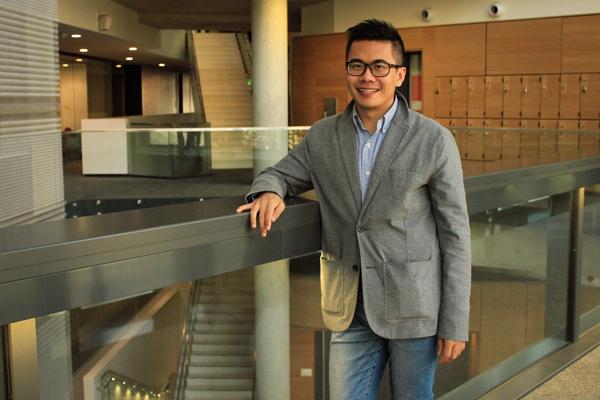Some men on campus will grow their facial hair this month in honor of “no shave November.” But health promotion and prevention services at GW are taking the month to raise awareness about men’s mental health.
Shawn Chiang, a graduate student in the Milken Institute School of Public Health, joined other organizations in a new social media campaign aimed at raising awareness for men’s mental health as part of his practicum in the Colonial Health Center. Chiang said he started the campaign, which is largely through social media, because men are often hesitant to seek out counseling for mental health issues.
“Men really care about their privacy and protecting their masculinity,” Chiang said. “Social media was the right approach to it in the sense that they can access that information on their own time without invading their privacy.”
Chiang got the idea to start the program after taking a social marketing course for his graduate degree in the public health school, he said.
He said he developed the program to raise awareness of men’s mental health through an online toolkit that includes information on mental illness, strategies to protect well-being and resources for professional treatment.
The campaign encourages students to take the “GentleMENtal Wellness” pledge to end the stigma around mental illness. The campaign is being promoted on Twitter and Facebook and uses the hashtag #GWitsOKtoTalk.
“It is important to raise mental health awareness for men because there’s a misconception that men should ‘tough it out’ when they face mental health struggles,” Chiang said. “We want to increase visibility and provide resources to address this at GW and beyond.”
Staff in Mental Health Services worked with Chiang to review the materials he would use in programming to ensure that the content was culturally inclusive, he said.
The Interfraternity Council supports the effort and will include its messaging in Greek Week, a week that brings sororities, fraternities and multicultural Greek organizations together through service and competition.
Chiang said that he chose to launch the campaign in November to complement “no shave November,” which raises awareness for cancer. He hopes to further the campaign’s reach by attaching it to an existing social media movement, he said.
Chiang, who will graduate at the end of December, said he will evaluate the campaign’s success at the end of the month by studying how many people posted about it or took the online pledge.
Alexis Knott, the associate director of health promotion and prevention services, said in an email that the GentleMENtal Wellness social media campaign was created to encourage men at GW to take action against mental health stigma.
Mental health experts said that events like this one that are directed at men should help them feel more comfortable seeking out help on mental health issues.
Dolores Cimini, an assistant director for prevention and program evaluation of university counseling at the University at Albany, State University of New York, said universities should work to normalize counseling resources for men.
Cimini oversees an anonymous peer hotline at the University at Albany and has noticed that men tend to call the hotline to use resources anonymously, she said.
“Each year when we look at our statistics, significantly more males call our hotline than females,” Cimini said. “Our hypothesis is that the anonymity serves to break down a barrier to mental health services.”
GW Listens, a student-run hotline that was set to launch this fall, delayed its opening date after a top administrator working on the program was laid off in a series of budget cuts in the Division of Student Affairs. The call line will not open until at least after Thanksgiving.
Victor Schwartz, the medical director for the Jed Foundation, a New York-based nonprofit organization that advocates for college mental health resources, said the recent dialogue around mental health on campuses has encouraged more universities to pursue new outreach methods.
“One of things that we have seen over the years with men in general, and maybe especially with young men, is that there is this natural hesitancy around asking for help,” Schwartz said. “There is a long-standing social disinclination for asking for help so because of that impediment, it is particularly important when men are in trouble that we try to find ways to make it okay to say that they can get help.”







